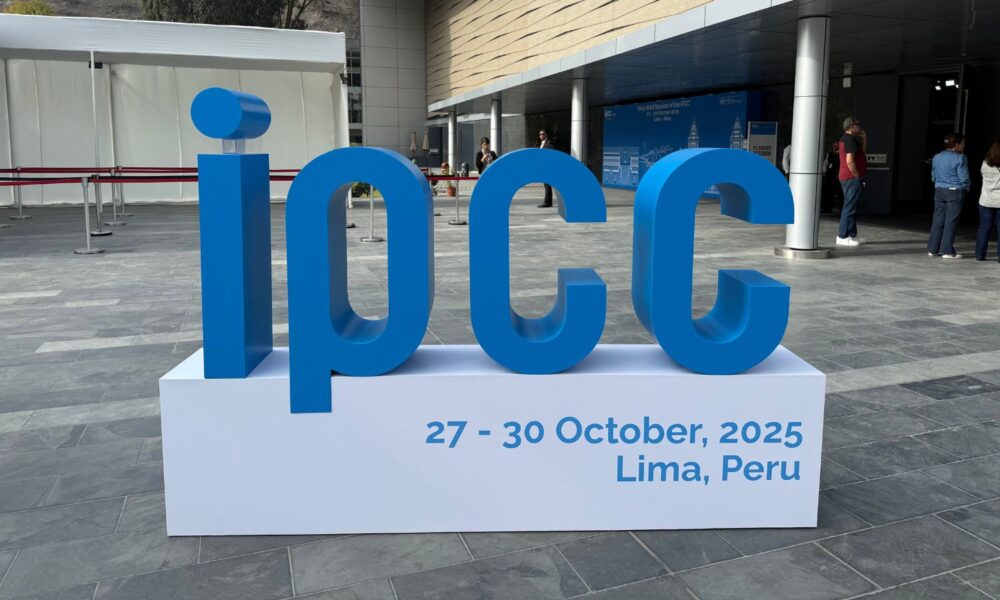Right now, I’m in Lima, Peru, where delegates from UN member countries are gathered for the 63rd session of the Intergovernmental Panel on Climate Change (IPCC). The meeting comes at a pivotal moment for international climate collaboration and just before the UN COP30 conference in Brazil. As climate impacts intensify and political polarization deepens, maintaining a shared, science-based foundation for global decision-making is essential.
This week’s session advances the IPCC’s seventh assessment cycle (AR7)—a process designed to assess the state of climate knowledge and provide an authoritative basis for action anchored in evidence. Bringing together thousands of scientists, economists, engineers, and policymakers, the IPCC synthesizes the best available science and makes it usable for decisionmakers worldwide.
After months of defending science the IPCC settled years ago, it’s a relief to be in a room of experts focused on advancing—not undermining—the evidence. The discussions here are technical, sometimes tedious, but deeply consequential, and they underscore how international cooperation can continue to hold the line against disinformation.
Just as in the last plenary in Hangzhou, China, the Trump administration’s decision not to participate weakens US engagement in one of the most important scientific collaborations of our time. Federal scientists from NASA, NOAA, and other agencies are absent once again at the plenary, and so is their leadership and technical expertise that have historically strengthened the IPCC’s work.
I’m here because the IPCC’s work is anything but abstract. Its reports serve to inform international climate negotiations, national policies, and legal decisions around the world. At a moment when climate impacts are accelerating and disinformation is eroding trust in science, the work here continues steadfast, and that is no small feat.
Why this meeting matters
Over the next several days, governments will work to make several key decisions that will shape this assessment cycle and influence how science informs climate policy for years to come. Here’s what I’m watching:
1. The Methodology Report on Carbon Dioxide Removal (CDR) Technologies, Carbon Capture, Utilization, and Storage (CCUS)
Countries were unable to reach consensus on this report outline during the last meeting. Now, the goal is to finalize it. This report is intended to compile and synthesize existing scientific methods and best practices for measuring, reporting, and verifying carbon dioxide removal (CDR). However, I expect the heated debate to continue, centered on whether to include marine CDR methods, such as ocean alkalinity enhancement, which currently lack long-term data and carry significant ecological uncertainties.
2. Progress Reports from the Working Groups
The IPCC’s working group reports sit at the heart of this process. This week, delegates will hear updates from each group:
- Working Group I: the physical science of the climate system—tracking changes in temperature, precipitation, and extremes.
- Working Group II: impacts, adaptation, and vulnerability—including new work on loss and damage.
- Working Group III: mitigation—focused on pathways to cut emissions and accelerate transitions.
I’m really looking forward to these essential checkpoints that help to keep the IPCC’s work on track and ensure that authors and experts have the resources and backing they need.
3. Report Timelines
Once again, the overall timeline for AR7 working group reports is on the agenda. With the next UNFCCC Global Stocktake (GST) scheduled for 2028, many countries are calling for the IPCC’s working group reports to be completed in time to inform that process. The decision has been postponed three times, and further delay could make a 2028 release impossible. Aligning science with policy cycles is important to ensure that the IPCC’s findings can effectively support global climate action and give negotiators the data they need at the right moment.
The stakes could not be higher
The Trump administration’s attacks on climate research and federal scientists threaten to isolate the United States at a time when global collaboration is essential and US scientific infrastructure is being eroded. In this environment, the IPCC’s role is more vital than ever. When governments attempt to silence and distort science, international processes like the IPCC ensure that the global scientific record remains intact.
Here in Lima, countries are demonstrating that scientific collaboration can persist even when politics falters. As an observer organization, the Union of Concerned Scientists remains committed to supporting scientific integrity, amplifying diverse voices, and ensuring that the next generation of IPCC reports reflects the best available evidence.
Over the coming days, delegates will debate the CDR outline, report on working groups, and hopefully set a clear timeline for the reports that will define this assessment cycle, and I will keep you updated on the progress. In the face of political headwinds, climate scientists continue to do what they do best and deliver the evidence we need to act. As countries prepare for COP30, I hope this is a reminder to listen to the science, invest in collaboration, and reject efforts to undermine it. Especially in uncertain times, science can help to light the way forward.

